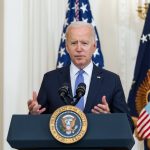The Biden administration has once again dipped into the taxpayer wallet, announcing a jaw-dropping $4.5 billion in student loan forgiveness for over 200,000 borrowers. The latest beneficiaries are former students of the dubious institution known as Ashford University, a largely online school that managed to enroll a staggering 261,000 students from March 2009 to April 2020. If the government keeps this up, they may need to invest in a golden shovel for all the money they’re digging up.
The Education Department, seemingly working overtime even as it winds down the Biden era, states that these loans are being forgiven due to “widespread misrepresentations” by Ashford University. Apparently, the school wasn’t just handing out degrees; they were also handing out unrealistic expectations. The Department of Education has discovered that potential students were sold a bill of goods regarding how long it would take to earn a degree, the actual costs incurred, and even the tantalizing promise of licenses that many of them would never obtain. This oversight marks an alarming lack of oversight for an institution that was supposed to be providing education.
The grand reveal comes from U.S. Under Secretary of Education James Kvaal, who reported that 90 percent of Ashford students failed to graduate. It sounds like a reality TV show: “Survivor: Ashford Edition,” where the odds are stacked against the students, and the only prize is a mountain of debt and a low-paying gig. The undersecretary’s comments suggest that Ashford’s recruiting tactics might have had more in common with car salesmen than educators, capitalizing on naive students who just wanted to better their lives.
Education Department forgives $4.5 billion in student loans for over 200,000 borrowers https://t.co/mY56kZDcsU
— Just the News (@JustTheNews) January 15, 2025
This is not merely a one-off announcement. The latest giveaway is part of a larger trend where the Biden administration has wiped the slates clean for over 5 million borrowers, amounting to an astronomical $34 billion in total debt relief since taking office. Some may wonder what sort of kindness this represents; others might consider it an alarming precedent for tampering with personal financial responsibility. A sudden debt forgiveness spree raises questions about the next generations’ understanding of fiscal accountability and commitment.
One can’t help but chuckle at the notion that former students will receive emails informing them of their financial liberation, with no action required on their part. In a world where personal initiative and hard work are celebrated, the government effectively says, “Sit back, relax, and let us handle your responsibilities.” Perhaps the real tragedy here is not just the debts forgiven but the lessons that remain unlearned about the value of education, the meaning of effort, and the importance of not falling for 100,000-dollar promises of prosperity from an online university. One can only hope that the lessons of Ashford University serve as a cautionary tale for future generations—or even better, a topic for the next big reality show.




